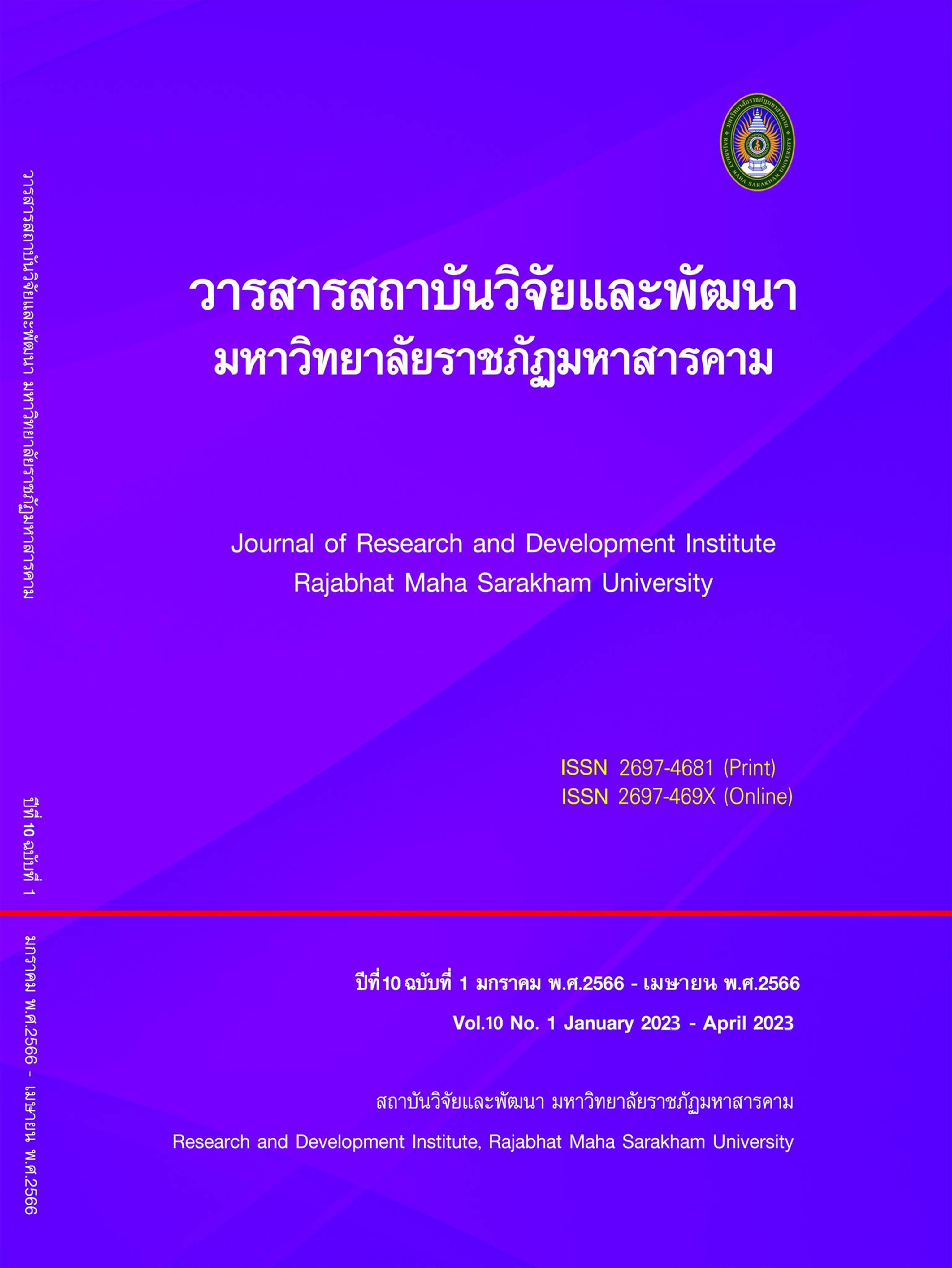The Study of Creative Problem-Solving Thinking Skills Using Project-Based Learning Management Model with Community-Based Learning Resources for Grade 6 Students in The Subjects SOC 16101 Social Studies Religion and Culture at Bankanlueangdong School
Keywords:
Creative Problem-Solving Thinking Skills, Project-Based Learning, Community-Based LearningAbstract
The objectives of this research were 1) to study creative problem-solving skills of grade 6 students in the subject SOC 16101 Social Studies, Religion and Culture by using project-based learning management model with community-based learning by giving students average score of not less than 70% of the full score and the number of students who have passed the criteria 70 percent or more, 2) to study the learning achievement of grade 6 students in the subject SOC 16101 Social Studies, Religion and Culture by using a project-based learning management model with community-based learning by giving students average score of not less than 70% of the full score and the number of students who have passed the criteria of 70% or more and 3) to study the satisfaction of grade 6 students towards project-based learning management model with community-based learning resources. The target group used in this research were grade 6 students at Bankanlueangdong school who are studying in the second semester of the academic year 2021, of 18 students. The study was conducted by applying the one-shot case study design for data collection. Research instruments included 1) a learning management plan using project-based learning management model with community-based learning resources, 2) a creative problem-solving skill test, 3) an evaluation test and 4) a questionnaire for assessing student satisfaction towards project-based learning management model with community-based learning resources. Data were analyzed to find percentage, mean and standard deviation.
The findings show that: 1) grade 6 students who received project-based learning management model with community-based learning resources scores on creative problem solving skills, the average was 59.78, representing 74.73% and there were 14 students who passed the criteria, representing 77.77% of the total number of students which is higher than the specified threshold, 2) grade 6 students who received project-based learning management model with community-based learning resources have an achievement score, the average was 21.61, representing 72.03%, and there were 14 students who passed the criteria, accounting for 77.77% of the total number of students which is higher than the specified threshold and 3) the satisfaction of grade 6 students towards project-based learning management model with community-based learning resources. Overall, the students had the highest level of satisfaction ( = 4.69, S.D. = 0.51). The students had the highest level of satisfaction in all aspects. They can be sorted as follows: Teachers ( = 4.83, S.D. = 0.37) Instructional Innovation Media ( = 4.79,S.D. = 0.39) Instructional Management ( = 4.71, S.D. = 0.46) Content (= 4.60, S.D. = 0.62) and evaluation measurement side ( = 4.51, S.D. = 0.69), respectively.
References
Chankani, K. et al. (2010). Executive summary recidivism of children and youth in Property offenses in Thailand: guidelines for prevention and corrected based on factors predictor in criminology. Bangkok: Office of Justice Affairs.
Diamanto, F., and Christos, G. (2010). Project-based learning in primary schools: effects on pupils' learning and attitudes. Education 3-13, 39(1), 35-47.
Dechakup, P. (2017). Teaching children to do projects. Teaching teachers to do research in the classroom. Guidelines for creating Thai people 4.0. (3rded.). Bangkok: Chulalongkorn University Press.
Mangkhang, C. (2018). Knowledge of Curriculum and Teaching in Social Studies. (2nd ed.). Bangkok: Chulalongkorn University Press.
Makkasaman, W. (2007). Project-based teaching. Bangkok : Chulalongkorn University .
Ministry of Education Thailand. (2008). Basic Education Core Curriculum B.E. 2551 (A.D. 2008). Bangkok: The Teachers Council Of Thailand.
Office of the Education Council. (2017). The National education plan B.E. 2560-2579. Bangkok: Office of the Education Council.
Pornkun, C. (2011). Teaching Thinking Process: Theory and Implementation. Bangkok: Chulalongkorn University Press.
Roy, H. (2019). The problem of projects: reconceptualising the use of Project-based Learning in Media Practice Education. England: University of Portsmouth.
Tangkhunanan, P. (2015). Classroom management and Learning resources. (4thed.). Bangkok: Mean Service Supply Limited Partnership.
Toomthong, B. (2007). Guidelines for the development of teaching thinking process. Bangkok: Mahasarakham University.
Torrance, E.P. (1965). Rewarding Creative Behavior. New Jersey: Prentices Halls.
Downloads
Published
How to Cite
Issue
Section
License
Copyright (c) 2023 เนติธร สุคำภา, อังคณา ตุงคะสมิต

This work is licensed under a Creative Commons Attribution-NonCommercial-NoDerivatives 4.0 International License.
Articles that are published are copyrighted by the authors of the articles







